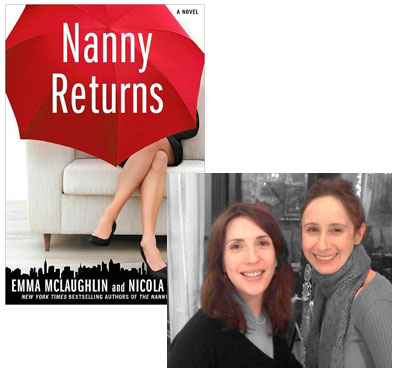Emma McLaughlin & Nicola Kraus: Nanny’s Back, But On Their Terms

After the success of The Nanny Diaries back in 2002, there was strong interest in the publishing world in an immediate sequel, even though, as Nicola Kraus (left) recalled over a recent lunch, “we were clear that Nanny would never nanny again, and we thought that was the end of the story.” Her co-author, Emma McLaughlin, elaborated; various publishers offered significant incentives for a sequel, but there were conditions: “They all wanted Nanny to get her comeuppance,” she explained; either Nanny would start her own agency where the nannies on the staff would put her through hell, or she’d have to hire a nanny who would put her through hell. “We walked away from those leads because we stood by what Nanny had said at the end of the book,” McLaughlin added. “And we didn’t get into writing to set up a franchise. We didn’t want to come back to Nanny unless we had something new to say about her.”
“It was a hard decision,” McLaughlin admitted. “It was a lot of money, enough that we would have been set –” “But it would’ve been a bad book,” Kraus chimed in. It wasn’t until two years ago that they hit upon the idea of Grayer, the pre-adolescent boy from The Nanny Diaries, discovering the videotape Nanny made at the end of that book and tracking her down for a confrontation. The question then became: What would happen? “It was different than any of the other books we’ve written since, in that from the beginning we knew all the characters very well,” Kraus said. “The real work of it was finding the story that would weave the characters back together.”
I wondered what the pair thought about the success of nonfiction like 740 Park in the years after The Nanny Diaries, as it seemed to me like a continuation of the fascination with a certain class of Manhattan (and by extension American) elites. Kraus acknowledged the point, then added that they’d been fascinated by the recent trial and conviction of Brooke Astor’s son for bilking her of millions while she was alive then forging alterations to her will. “How would the dysfunctions we depicted in the first novel play out over generations?” she asked rhetorically. “How would the economy falling apart affect a class of people who have chosen money over love?” And thus: Nanny Returns.
Going back to the authors’ insistence on not pumping out a Nanny sequel in ’02, we talked about the progression to the novel that did come next, Citizen Girl. “The Nanny Diaries, to us, was always a novel about work,” McLaughlin said. “and we were fascinated by the way that young women were being treated as employees as new media companies.” The silence about that exploitation seemed as prominent a blind spot to them as the silence about what domestic help had been put through, but they recognized that Citizen Girl would be a much different work; if Nanny Diaries was “a three-act play set in an elevator vestibule,” as McLaughlin laughingly described it, Citizen Girl was taking a much more complex economic situation and attempting to boil it down into a narrative framework. And though the backlash was vehement (perhaps in part, she observed, because some critics appeared to find two young women who didn’t have a “real” writing background attempting a novel addressing important themes overly presumptuous), it did have its champions—including The New Republic—and sold (“quietly,” McLaughlin laughed) about 200,000 copies.
We reflected that when Citizen Girl was published, young feminist media consisted pretty much of Bust and Bitch, but in the last half-decade there’s been a proliferation of sites like Jezebel and Feministing… in some ways, I speculated, solidifying a potential audience for McLaughlin and Kraus’s 21st-century blend of pop culture and feminist critique. McLaughlin addressed the situation more broadly: “It makes me feel more optimistic about the future,” she observed. “It’s great to see the women of our generation asking these questions.”
Meanwhile, the collaboration between the two grows ever stronger. “We trust each other so completely now,” Kraus said of their working relationship. “We used to get so entrenched in our perspectives, but now there’s maybe one thing in each book that each of us will dig our heels in about, whereas it used to be one in each chapter.” That’s good, because there’s plenty more work to do; the two put away note-scribbled pages from a screenplay when I arrived at our table, and next year they’ll be publishing Over You, their second YA novel… oh, and there’s a draft due on their next adult novel, too.
10 January 2010 | interviews |

 Our Endless and Proper Work is my new book with Belt Publishing about starting (and sticking to) a productive writing practice.
Our Endless and Proper Work is my new book with Belt Publishing about starting (and sticking to) a productive writing practice. 
